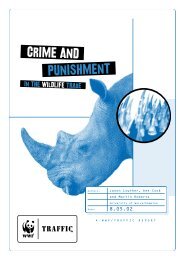Influencing Power - WWF UK
Influencing Power - WWF UK
Influencing Power - WWF UK
- No tags were found...
You also want an ePaper? Increase the reach of your titles
YUMPU automatically turns print PDFs into web optimized ePapers that Google loves.
<strong>Influencing</strong> <strong>Power</strong>3Executive SummaryThis report describes the results of aSustainAbility and <strong>WWF</strong> research project toreview how 100 of the world’s largestcompanies report on their lobbyingpractices. Our objective was to assesscorporate transparency on lobbying andpublic policy behaviour, and the degree towhich reported activities align with corebusiness values, particularly when it comesto influencing governments on keycorporate responsibility issues, such asclimate change and human rights.Benchmarking Corporate LobbyingThis report is very much a work in progresson this agenda and follows on from our2000 publication, Politics and Persuasion,produced in partnership with the Omnicomlobbying firm Government PolicyConsultants (GPC). Where the 2000 reportmade the then bold claim that corporateresponsibility practices should be explicitlylinked with a company’s lobbying andpublic policy activities, this report looks athow a cross-section of businesses hassubsequently responded to the challenge oftransparency and reporting in this area.The report ranks how 100 major companiesnow report on lobbying and its relationshipto their core business — from the provisionof no information, through to basic,developing, systematic and integratedreporting. While the methodology revealedthat over 50% (51) of our sample achievedat least a basic rating and that a handful ofcorporate reports make it into thesystematic category — BASF, BP, Chevron,Dow, Ford, General Motors,GlaxoSmithKline and HP — no high scoreswere without issue or qualification. Widerresearch and the process of independentreview raised several questions with regardto the consistency of wider corporatelobbying activities that may not have madeit into their formal corporate responsibilityreport.For instance, while Ford and GeneralMotors may have high levels oftransparency and a growing sophisticationin reporting their lobbying activities, theystill actively resist controls on greenhousegas emissions via sponsorship of theirindustry trade group. Similarly, whileGlaxoSmithKline may report on theexcellent work it is doing on access policiesfor essential drugs in developing countries,it is also a major member of PhRMA, whoseposition on intellectual property rights isstrongly criticised by HIV/AIDS policyexperts.Transparency and ConsistencyInconsistent approaches to corporatelobbying — saying different things todifferent people via different parties — areunlikely to be tenable for the long term.Legislative developments and growinginterest from shareholder activists andNGOs, plus internal aspirations for greateralignment, are likely to drive change. Beingseen to conduct lobbying activities in waysthat are transparent and consistent withcore business — and wider societal — valueswill be essential to re-establish trust with avariety of stakeholder groups. Based onemerging good practices within ourresearch group, the report makesrecommendations on how companies canconsider and evolve their current approachto responsible lobbying and influence.Third Generation LobbyingAlthough our research finds thattransparency around lobbying isincreasingly accepted, most companiesstrike an overwhelmingly defensive tone —asserting their right to lobby and theirpositions on particular issues. This approachwe characterise as ‘second generation’corporate responsibility. Here, the maindriver is risk management, and transparencyand consistency in lobbying are promotedprimarily as a way of minimisingreputational risk to the business.In contrast a ‘third generation’ approachwould view corporate responsibility as astrategic differentiator and recognise thepotential for lobbying to help drive strongersocial and environmental policy frameworksin support of core business. A fewcompanies show indications of evolving thisapproach, such as the support IBM andPhilips give to waste recycling, or the verypublic stance that the Corporate LeadersGroup on Climate Change took inencouraging <strong>UK</strong> Prime Minister Tony Blairto pursue more aggressive policies onclimate change. However these initiatives,while welcome, are largely underminedwhere other lobbying activities appear toreflect a ‘first’ or ‘second generation’attitude. The overall impact is contradictionand inconsistency, communicating a senseof hidden agendas and stories only halftold.Shortly before this report went to print, itseemed apt that there should be mediacoverage of the role ExxonMobil hasplayed in helping frame the USadministration’s position on climatechange, 1 as well as alleged inconsistenciesbetween BP’s position as a member of theCorporate Leaders Group on ClimateChange and its lobbying activities inWashington DC. 2 It seems unlikely thatthese are exceptional instances in theblurred and complex relationships betweenbusiness and government. The shift towardstransparency and consistency in thepractice, reporting and disclosure ofcorporate lobbying appears to have onlyjust begun.Three Generations of Corporate Responsibility and LobbyingLobbyingFirst GenerationSecond GenerationThird GenerationState of CR‘CR as PR’CR as a way ofmanaging reputationor operational riskCR as strategicdifferentiatorRole of LobbyingLinks betweenlobbying and CRare rejectedTransparencyand consistencysupported primarilyas part ofreputational riskmanagementLobbying as anopportunity to drivestronger social andenvironmental policyin support of corebusinessFigure 0.1




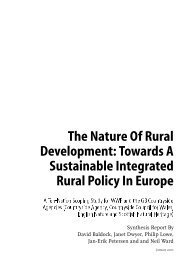
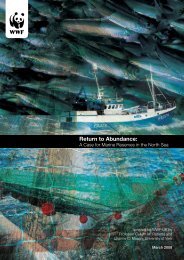



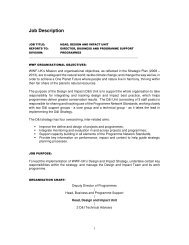



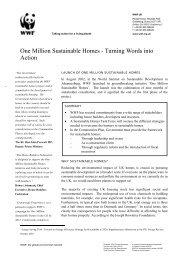
![[PDF] Causes for concern: chemicals and wildlife - WWF UK](https://img.yumpu.com/31929970/1/184x260/pdf-causes-for-concern-chemicals-and-wildlife-wwf-uk.jpg?quality=85)
